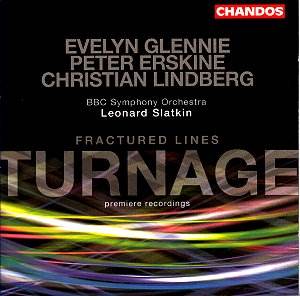Turnage’s music has often been described as "violent"
and "jazz-influenced". These descriptions – as is often the
case – have more than a grain of truth about them although they do not
reflect the multifarious nature of his music. His orchestral music is
often rhythmically energetic and full of dynamic contrasts, but his
chamber music, some of which has been recorded some time ago on Black
Box BBM 1065 (reviewed a few months ago), is more restrained and shows
the private man as opposed to the public man at work in the orchestral
works and the operas. The four recent pieces recorded here partly belie
the ready-made description alluded to above. Four-Horned Fandango,
composed in 1995/6 and revised in 2000, is a work in which Turnage demonstrates
the wide variety of his emotional and compositional palette. This really
beautiful work is probably one of his most sensuous and most accessible
scores. It opens with soft strings, somewhat reminiscent of the opening
of Ravel’s La Valse, setting the scene for the exultant
music for horn quartet (one thinks here of Tippett who was such an influence
on Turnage’s music making). The whole piece overflows with joyfully
dancing energy which makes this sunny, extroverted work a joy to listen
to.
Another Set To for trombone and orchestra,
superlatively played by Christian Lindberg, is overtly influenced by
jazz. Again this displays a healthy energy characteristic of Turnage’s
finest music. It opens with a braying call to arms before the music
launches an unbridled dance of tremendous verve supported by jagged
rhythms from the orchestra. A brief restatement of the opening call
leads into a dazzling, sparkling conclusion.
Silent Cities is Kipling’s description
of the graveyards on the Somme which Turnage visited in 1997. The sites’
apparent peacefulness, however, does not conceal "the turmoil under
the surface". At another level it is difficult to relate to the
massacres of World War I that took place on these very sites. That Turnage
might have been moved to translate his inner feelings into music is
no surprise. One of the earliest works to attract attention was his
piece for chamber ensemble Let Us Sleep Now (i.e. the
last words from Owen’s poem Strange Meeting and from Britten’s
War Requiem). Thus, Silent Cities continually
alternates dream-like, almost pastoral episodes with violent, war-like
outbursts of great power. It builds to some fierce and shattering climaxes.
The piece ends with an ambiguous epilogue, "all passion spent",
though unable to "dispel the fears". Silent Cities
is, no doubt, one of his most personal, powerfully impressive and deeply
moving utterances so far.
Paul Scofield who provided the "theme" for
Silent Cities and Peter Erskine, one of the percussionists
in Fractured Lines, are both musicians with whom Turnage
has previously co-operated e.g. in his gripping ensemble piece Blood
on the Floor. Fractured Lines, composed in 1999/2000,
is a double percussion concerto for Evelyn Glennie and Peter Erskine
who also provided the tune on which the piece is based. As a whole,
it is a formidable display of often virtuosic writing for percussion
and of brilliantly scored music. It is also overtly jazzy, but always
in Turnage’s highly personal approach. In fact, his music may often
be jazz-inflected, but it never slavishly mimics jazz clichés;
rather it absorbs and transforms jazz elements into a personal vision
achieved in imaginative, gripping music of not inconsiderable strength.
However, I found Fractured Lines marginally less satisfying
than the other works, but it is still a formidable piece of music in
its own right.
Superlative performances and superb recording up to
Chandos’s best. I enjoyed this release enormously and I am eagerly waiting
for any new recording of Turnage’s music.
Hubert Culot

